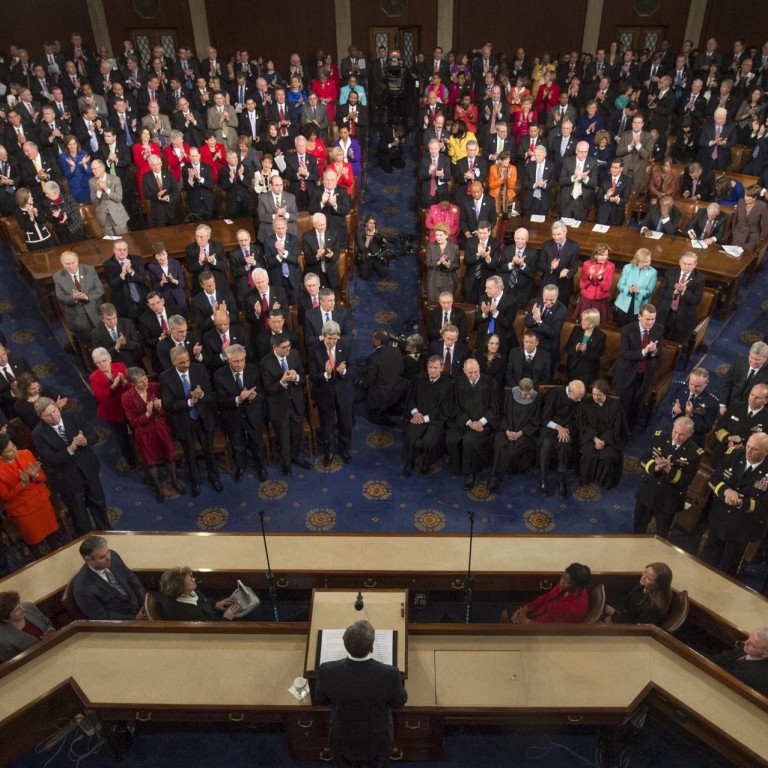
Update | Obama speech reflects decision to make greater use of executive powers
State-of-the-union address reflects president's decision to spend less time negotiating with recalcitrant lawmakers in divided Congress
This wasn't the presidency Barack Obama had in mind after winning his historic election five years ago. But it is the one he believes he has left.
For the first time since taking office, Obama spoke to Congress in Tuesday evening's state-of-the-union address from a clear position of confrontation, threatening to veto new Iran sanctions, warning against further moves against his healthcare law and demanding action on a series of previously proposed economic measures.
The areas he identified for possible co-operation with a divided Congress have shrunk, leaving an agenda filled out by a growing number of modest initiatives that he told lawmakers he intended to carry out alone.
Among them is an executive order raising the minimum wage paid under future federal contracts. In a tone less resigned than dismissive, Obama said he intended to implement more than a dozen others this year, including initiatives to improve job-training skills, technology in classrooms and fuel-efficiency standards in trucks.
Watch: US President Barack Obama's State of the Union Speech
The approach, outlined in a speech that ran more than an hour, reflects the White House's conclusion that Obama spent too much time last year in conflict with recalcitrant lawmakers, rather than using the unilateral powers in his grasp.
But the go-it-mostly-alone strategy risks further antagonising Congress and resting part of his legacy on executive actions that do not have the permanence, or breadth, of major legislation.
The more executive-style presidency scores high with the public after years of political deadlock in Washington. It also marks a refiguring of Brand Obama, the politician who promised to govern more modestly and co-operatively with the opposition after the polarising years of the George W. Bush administration.
In his fifth state-of-the-union address, Obama set that aside.
By declaring his intention to ignore Congress when necessary as lawmakers looked on, the president framed an election-year debate about which party was more determined to solve the nation's enduring economic problems.
He called his ideas "a set of concrete, practical proposals to speed up growth, strengthen the middle class and build new ladders of opportunity into the middle class".
"Some require congressional action, and I'm eager to work with all of you," he said. "But America does not stand still, and neither will I. So wherever and whenever I can take steps without legislation to expand opportunity for more American families, that's what I'm going to do."
The speech revealed Obama's frustration about his lack of progress in key areas, and the diminishing time left to secure his legacy after a largely lost year. He scolded Congress for last year's 16-day government shutdown, saying the paralysis showed that "we are not doing right by the American people".
He called on Congress to take up gun control again after defeating his proposals to restrict sales last year, help close the military prison at Guantanamo Bay, and refrain from working to repeal the Affordable Care Act after dozens of unsuccessful attempts.
"We owe it to the American people to say what we are for," Obama said, "not just what we are against."
Obama's speech showed just how much the "hope and change" he promised in his 2008 campaign had been honed down by years of partisan conflict, replaced by the narrower ambitions on display on Tuesday.
The core of the speech was a series of specific policy prescriptions to address the tenuous condition of America's middle class and the disparity in opportunity that economic imbalances have opened. His tone was populist, if not overtly partisan.
In one reference that drew raucous bipartisan applause, Obama noted proudly that House Speaker John Boehner, a Republican, was the son of a barkeeper, prompting a thumbs up from his sometimes partisan opponent seated behind him.
With his insistence that he will sidestep Congress if necessary, Obama placed himself in many ways against the institution, not just his most ardent Republican opponents.
It is, in one clear way, safe political ground: only 16 per cent of Americans approve of the way Congress is handling its job, according to a -ABC News poll published this week.
With the speech now out of the way, Obama has two such addresses left, to be delivered against a backdrop of waning public interest in his presidency.
